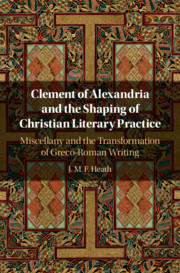 Clement of Alexandria and the Shaping of Christian Literary Practice
Clement of Alexandria and the Shaping of Christian Literary Practice Theological Interpretation of a Miscellanistic Aesthetic
Published online by Cambridge University Press: 16 December 2020
Variety was the hallmark of miscellanism, and Clement draws attention to his participation in this miscellanistic aesthetic in programmatic passages on the literary form of his work. He privileges the vocabulary of poikilia,which not only captured the miscellanistic aesthetic of variety but was also a key term in reflection on the problems and possibilities of variety in aesthetic, ethical, theological and pedagogical spheres. Plato and Philo had also given it prominence in their own engagement with ethical and theological problems of variety. Clement addresses the challenge of variety in shaping his project: his three works, Protrepticus, Paedagogus and Stromateis,organise a pattern of Christian formation that cultivates ethical simplicity with a view ultimately to discerning God’s poikilic wisdom and even in the poikilia of Clement’s own text. Whereas previous studies of Clement have wrestled with the philosophical problem of the ‘many and the one’, this chapter shows that that problem also had a significant literary, aesthetic and ethical dimension, better captured by the terminology of poikilia.
To save this book to your Kindle, first ensure [email protected] is added to your Approved Personal Document E-mail List under your Personal Document Settings on the Manage Your Content and Devices page of your Amazon account. Then enter the ‘name’ part of your Kindle email address below. Find out more about saving to your Kindle.
Note you can select to save to either the @free.kindle.com or @kindle.com variations. ‘@free.kindle.com’ emails are free but can only be saved to your device when it is connected to wi-fi. ‘@kindle.com’ emails can be delivered even when you are not connected to wi-fi, but note that service fees apply.
Find out more about the Kindle Personal Document Service.
To save content items to your account, please confirm that you agree to abide by our usage policies. If this is the first time you use this feature, you will be asked to authorise Cambridge Core to connect with your account. Find out more about saving content to Dropbox.
To save content items to your account, please confirm that you agree to abide by our usage policies. If this is the first time you use this feature, you will be asked to authorise Cambridge Core to connect with your account. Find out more about saving content to Google Drive.